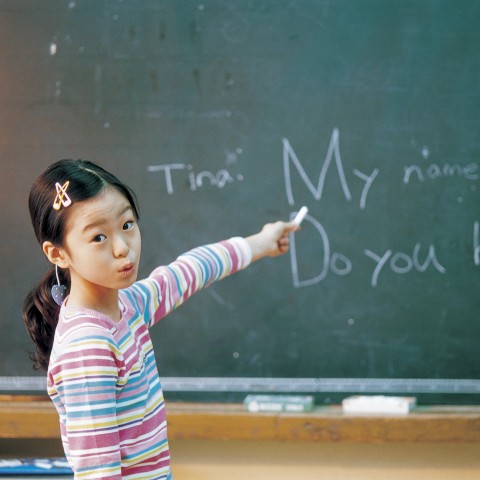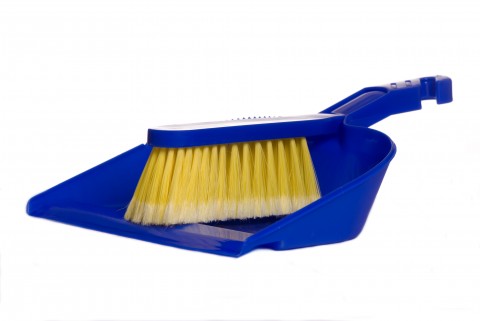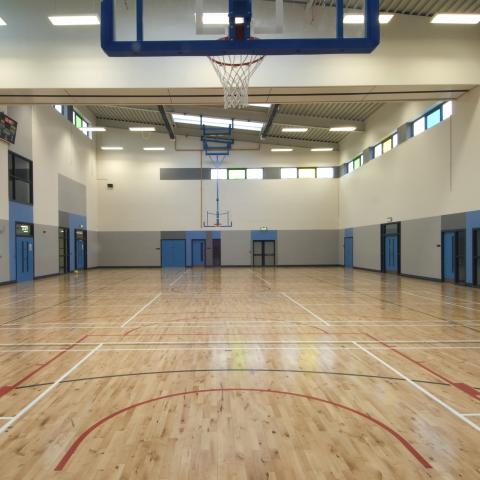
The first official school in South Africa, called the South African College Schools, or SACS, as it is still known, was founded in 1829 in Cape Town. A boys-only school, it’s still located in the former Cape Town home of a mining magnate where, in 2012, the estate was the majestic location for the second film in the successful South African movie franchise, Spud.
Despite it being an English medium school, its halls nevertheless ring with Afrikaans school phrases too, as Afrikaans language learning is important in all South African schools.

Afrikaans word in elke skool in Suid Afrika aangebied as ‘n vak. / “Afrikaans is taught in every school in South Africa.”
- ➜ Afrikaans language learning can be a rich and rewarding experience for students of all ages. Learn ten good reasons for studying Afrikaans in this informative article.
Now let’s get cracking with probably the most comprehensive list of Afrikaans classroom phrases in English!

Alle Suid Afrikaanse publieke skole vereis dat leerlinge skooluniforms dra. / “The wearing of school uniforms is mandatory in all South African public schools.”
 Table of Contents
Table of Contents
- Forms of Address in Afrikaans Schools
- Start Of Class
- During Class
- End of Class
- Supplies and Equipment in the Classroom
- BONUS: Useful Afrikaans School Vocabulary
- South African Schools—A Few Facts
- Learn Useful Afrikaans School Phrases at AfrikaansPod101.com!
1. Forms of Address in Afrikaans Schools
But before we start looking at Afrikaans classroom greetings—forms of address are significant in especially Afrikaans-medium schools, where a culture of respect for all adult staff is still important. In fact, this is a hallmark of nearly every native Afrikaans speaker.
In practice, this means that if there is an age gap of more than 10 years, adults are typically not addressed with the casual jy and jou pronouns or by their first names. Instead, they are addressed, rather stiltedly, by their titles.
At school, then, learners replace all pronouns with titles when addressing a teacher, and using the teacher’s first name is avoided. Doing this is seen as a form of disrespect.
Teachers, however, address pupils by their first names and use informal or casual pronouns.
Here are the two main titles Afrikaans pupils use to address teachers in South African schools:
| Juffrou Note: This is the form of address pupils use to refer to their female teachers from Gr. R – Gr. 12—irrespective of her marital status. | “Miss” or “Ma’am” |
| Meneer | “Sir” |
Example Dialogue: Teacher: Lekker middag vir jou, Bertus. Approximate: “Have an enjoyable afternoon, Bertus.” Bertus: Meneer moet Meneer se middag ook geniet! Literally: “Sir must also enjoy Sir’s afternoon!” Bertus sounds a bit like a previous-century butler working in an old English abbey, doesn’t he?! In tutoring settings, however, such as when studying or teaching Afrikaans privately or via an online class, the use of casual pronouns and first names is completely acceptable. | |

Senior leerlinge mag soms in privaatdrag eksamen skryf. / “Senior pupils may sometimes write exams in private wear.”
Anyway, whatever your need for intricate or basic Afrikaans classroom phrases, we’ve got you covered in this article!
2. Start Of Class
So, the bell rang, and the pupils are seated. Looking out over their charges, teachers will start the day with suitable Afrikaans classroom greetings and other Afrikaans language phrases to connect with the children.
1 – Teacher Phrases
Afrikaans Classroom Greetings
Noise and bustle are endemic to classrooms, there’s just no escaping that! Classroom management is not always easy, and any person might be tempted to subdue the noise with shouting or harsh discipline.
However, a wise teacher will know that her attitude and demeanor will set the tone for everyone in the class, probably for the rest of the day. Therefore, she strives to start every school day with a friendly greeting, showing personal interest in her young charges, and keeping a calm manner. Maintaining authority and order without sacrificing anyone’s dignity are always worthy aims.
Here are a few friendly, standard greetings, plus excellent customizable phrases with which to make pupils feel welcome.
| Goeiemore, Graad Twees | “Goodmorning, Grade Two’s.” |
| Middag, julle. | Literally: “Afternoon, (all of) you.” |
| Haai daar, Francis | “Hi there, Francis.” |
| Goeiedag, almal. | “Good day, everyone.” |
| Hello, Klas. | “Hello, Class.” |
| Hoe gaan dit vandag? | “How are you doing today?” |
| Voel jy beter vanoggend, Dawie? | “Are you feeling better this morning, Davey?” |
| Welkom terug, Annabel. | “Welcome back, Annabel.” |
| Hoe voel jou been? | “How does your leg feel?” |
| Sjoe, maar dis koud vandag. | “Wow, it’s cold today.” |
| Wat ‘n lieflike oggend is die nie?! | Approximate: “What a beautiful morning it is!” |

Vra enige onderwyser—enige gebaar van waardering is altyd welkom! / “Ask any teacher—any gesture of appreciation is always welcome!”
- ➜ Take control of your Afrikaans classroom management with this list of common ways to greet in Afrikaans—with voice recordings!
Taking Roll Call
Now it’s time for the teacher to check who’s in attendance. This usually takes place only at the start of the day for all juniors and seniors, or during what is called the register klas (“register class”) for learners from Grade 5 onwards.
From Grades 1 through 4, learners remain in the same class all day long and receive tuition from only one teacher for all subjects. From Grade 5 onwards, they change classes and teachers for most subjects.
The Afrikaans expression for taking roll call is register neem. It’s derived from British English, which means “to take register”.
| Stilte vir register, asseblief! | “Silence for roll call, please!” |
| Enigiemand afwesig? | “Anybody absent?” |
| Wie’s nie hier vandag nie? | “Who’s not here today?” |
| Is Emma al terug? | “Is Emma back?” |
| Almal is hier / aanwesig. | “Everyone’s here / present.” |
| Waarom was jy laasweek afwesig, Francois? | “Why were you absent last week, Francois?” |
| Wat’s fout met Anya? Weet iemand? | “What’s wrong with Anya? Does anyone know?” |
| Weet iemand wanneer Petra terugkom klastoe? | “Does anyone know when Petra will return to class?” |
| Is Gert aanwesig? | “Is Gert present?” |

Meeste Suid Afrikaanse skole het standaard klaskamers. / “Most South African schools have standard classrooms.”
- ➜ Quickly learn how to greet like a native Afrikaans speaker with this recording of basic Afrikaans greetings!
2 – Class and Pupil Phrases
The relationship is reciprocal—pupils also greet and respond to their teacher’s enquiries.
Afrikaans Classroom Greetings
| More Juffrou, more Maatjies. Note: In the pre-school and junior classes, the children are usually taught one appropriate greeting phrase, which they then use in the same sing-song fashion every morning. | “Good morning, Miss, good morning, Buddies.” |
| Goeiemore, Juffrou. | “Good morning, Miss.” |
| More, Juffrou. | “Morning, Miss. |
| Goeiemiddag, Meneer. | “Good afternoon, Sir.” |
| Middag, Meneer. | “Afternoon, Sir.” |
| Hello Juffrou / Meneer. | “Hello Miss / Sir.” |
| Dit gaan goed, dankie. En met Juffrou? | Literally: “It’s going well, thank you. And with Miss?” |
| Dit gaan goed met my, dankie Meneer. | “I’m doing well, thank you, Sir.” |
| Goed dankie, en met Meneer? | “Well thanks, and with Sir?” |

Wie weet die antwoord? / “Who knows the answer?”
Answering Roll Call
During roll call, learners are usually expected to indicate their presence by announcing it out loud.
Below are a few basic Afrikaans classroom phrases to demonstrate how pupils typically respond during roll call in a South African school.
| Teenwoordig! | “Present!” |
| Ek’s hier. | “I’m here.” |
| Gert is aanwesig / afwesig. | “Gert is present / absent.” |
| Ek’s terug, Juffrou. | “I’m back, Miss.” |
| Emma is terug. | “Emma is back.” |
| Petronel is nie hier nie. | “Petronel isn’t here.” |
| Petra kom nie terug nie. | “Petra won’t return.” |
| Anya is siek met verkoue. | “Anya is sick with a cold.” |
| Ek voel beter, dankie Juffrou. | “I feel better, thanks Miss.” |
| Ek was siek gewees, Juffrou. | “I was sick, Miss.” |
| Hier’s my siekbrief / dokter’s brief. Note: In South African public schools, school fees are largely subsidized by the state, so truancy is unfortunately a problem. Therefore, a child must produce a doctor’s note if their prolonged absence was due to illness. Absenteeism is not a typical problem in private schools, because fees are not subsidized, and parents are therefore more motivated to make sure their children attend school. For this reason, the parents’ word instead of a doctor’s note is usually acceptable. | “Here’s my doctor’s note.” |

My naam is Tina. / “My name is Tina.”
Exercise: Above, the teachers’ greetings and roll-taking questions are matched with the student’s replies. Why not turn these into an Afrikaans listening comprehension exercise? Ask an Afrikaans speaker or your AfrikaansPod101 tutor to record the questions and answers for you. Then, while listening to the questions, choose the correct reply, and vice versa!
3 – Introducing Yourself to the Class—Teacher and Pupil
In many schools, it’s a custom for new pupils and teachers to introduce themselves to the class at the beginning of the year. They are also sometimes expected to share a detail or two about themselves.
Below are a few great phrases for such an occasion.
| Ons gaan onsself nou aan mekaar voorstel. | “Now we’re going to introduce ourselves to each other.” |
| Vertel die klas wat jou naam is, of jy ‘n broer of suster het, en wat jou gunsteling … is. | “Tell the class your name and surname, if you have siblings, and what your favorite … is.” |
| My naam is … | “My name is …” |
| Ek is … | “I am …” |
| My gunsteling (noun) is (noun). | “My favorite (noun) is (noun).” |
| Ek het (‘n) … | “I have (a) …” |
| Ek woon … | “I live …” |
Examples: Pupil: Ek is Sebastiaan Steenkamp. Ek is agt jaar oud en ek het een boetie. Ek hou van karre.“ I am Sebastian Steenkamp. I’m eight years old and I have one brother. I like cars.” Teacher: My naam is Juffrou Sandra Van Rooyen. Ek is julle nuwe Afrikaanse onderwyser en ek bly naby die skool in Vishoek. My gunsteling fliek is ‘Die Wonderwerker’. “My name is Teacher Sandra Van Rooyen. I’m your new Afrikaans teacher and I live close to the school in Fish Hoek. My favorite movie is Die Wonderwerker. (The Miracle Worker)” | |
- ➜ For the most common Afrikaans nouns you could use when talking about yourself, take a look at this article!
3. During Class

Skool moet genotvol wees om suksesvolle ‘n leerervaring te verseker. / “School must be enjoyable in order to ensure a successful learning experience. “
1 – Phrases and Questions for Teachers
Time to start the lessons! A successful teacher will have done their preparation and ensures that everyone knows what’s expected of them for the duration of the class. But first, they want to make sure the environment is pleasant and conducive to learning.
Classroom Duties
While all schools have cleaners or make use of cleaning services, it’s expected of the learners to help keep the classrooms neat, tidy, and well ventilated. Here are a few good phrases the teacher could use to rally up assistance.
| Maak al die vensters oop, asseblief. | “Please open all the windows.” |
| Maak die deur toe, asseblief. | “Close the door, please. |
| Dis jou beurt om die witbord skoon te maak. | “It’s your turn to clean the whiteboard.” |
| Gooi asseblief julle rommel in die asblik. | “Please put your garbage in the trashcan.” |
| Maak skoon, asseblief. | “Clean up, please.” |
| Vee daardie op. | “Sweep that up.” |
| Saamwerk laat die droom werk! | “Teamwork makes the dream work!” |
| Handewas tyd! Note: Higiëne is taught as a subject in the pre-school and Junior classes. Also, little ones tend to get a lot dirtier during class time than the seniors, so before breaks, the teacher makes sure those grubby paws are washed. Junior classrooms usually have facilities for this activity. | “Time to wash our hands!” |

Kinders word in die klaskamer geleer om hul omgewing te beheer deur dit netjies te hou. / “Children are being taught in the classroom to control their environment by keeping it tidy.”
Learning can only take place when focus is disciplined. It’s a valuable skill everyone needs to learn at school, even though acquiring it is not always enjoyable for youngsters.
It’s also imperative for a teacher to maintain good Afrikaans classroom management to accomplish successful learning outcomes. For that, a few rules establishing boundaries and order must be in place at the start of every class. Knowing exactly what is expected of them adds to the children’s sense of security, and an ordered environment helps classroom activities run smoothly.
Class Practice – Keeping the Order
Order in the classroom is not easily accomplished! Learners, especially the younger ones, often need repeated reminders of the class rules. This can be tough on everyone at the start, but with persistence, pupils learn and peace reigns. Then enjoyable Afrikaans language learning can start!
Here are a number of useful phrases for maintaining a classroom atmosphere conducive to learning.
| Steek asseblief julle hande op as julle ‘n vraag het. | “Please raise your hand if you have a question.” |
| Steek op jou hand as jy die antwoord ken. | “Put up your hand if you know the answer.” |
| Moenie die antwoord uitroep nie. | “Don’t shout out the answer.” |
| Hande op, asseblief! | “Hands up, please!” |
| Stilte, asseblief! | “Quiet, please!” |
| Hou op praat, asseblief. | “Please stop talking.” |

‘n Kalm onderwyser beteken rustige leerlinge. / “A calm teacher means peaceful learners.”
Tip: Memorizing the rules are often an excellent classroom practice, especially for younger students. It could also be turned into an Afrikaans listening comprehension exercise by simply ask the students to translate the rules from Afrikaans to English. Language learning is made easier the more interactive it is. To ensure proper pronunciation, a native Afrikaans speaker should recite the rules in Afrikaans.
Class Practice—About Learning Content
At last it’s time to start with the lesson itself…
Ideally, the teacher will guide the students to discover and explore the learning material for and by themselves. For this, open-ended statements and questions are ideal.
Yet, clear instructions are often necessary too. Here are a few helpful Afrikaans school phrases for these purposes.
| Is almal gereed? | “Is everyone ready?” |
| Kan ons begin? | “Can we start?” |
| Vandag gaan ons leer van … | “Today we’re going to learn about …” |
| Ons gaan kyk na … | “We’ll be looking at …” |
| Sê agter my aan. | “Repeat after me.” |
| Herhaal wat jy gesê het? | “Repeat what you said?” |
| Sê weer? | “Say again?” |
| Lees dit hardop vir die klas. | “Read it out loud for the class.” |
| Praat bietjie harder dat almal kan hoor. | Approximate: “Speak up a little so everybody can hear.” |
| Maak julle handboeke oop op bladsy … | “Open your textbooks on page ….” |
| Blaai na die volgende bladsy. | “Turn to the next page.” |
| Lees vanaf die tweede paragraaf. | “Read from the second paragraph” |
| Kyk na punt vyf. | “Look at point five.” |
| Hou my lippe dop terwyl ek die woord sê. | “Watch my lips as I pronounce the word.” |
| Mens spreek dit so uit. | “One pronounces it like this.” |
| Kyk mooi. | “Look carefully.” |
| Kyk weer. | “Look again.” |
| Onderstreep al die … met ‘n potlood. | “Underline all the … with a pencil.” |
| Luister mooi. | “Listen carefully.” |
| Luister weer. | “Listen again.” |
| Op watter lettergreep val die klem in die woord …? | “Which syllable is emphasized in the word …?” |
| Wie gaan eerste wees? | “Who wants to go first?” |
| Wie’s volgende? | “Who’s next?” |
| Verduidelik dit in jou eie woorde. | “Explain it in your own words.” |
| Wat bedoel jy hiermee? | Approximate: “What do you mean to say here?” |
| Dink daaroor. | “Consider it.” |
| Skryf jou antwoord in jou notaboek. | “Write your answer in your notebook.” |
| Enige vrae? | “Any questions?” |

| Afrikaans Grammar—Targeted Teaching Phrases Grammar in every language has certain unique distinctions and quirks. Here are a few pertaining to Afrikaans grammar—stated in excellent Afrikaans classroom phrases!
| |
| Let op na die gebruik van dubbel-negasie in hierdie sin. | “Notice the use of double-negation in this sentence.” |
| Afrikaanse werkwoorde vervoeg nie volgens onderwerp nie. | “Afrikaans verbs don’t conjugate for the subject.” |
| Let op dat Afrikaans nie grammatikale geslag het nie. | “Note that Afrikaans has no grammatical gender.” |
| Afrikaans het drie geslagsverwante voornaamwoorde. | “Afrikaans has three gender-related pronouns.” |
| In Afrikaans is daar geen onderskeiding tussen die infinitiewe en teenwoordige-tyd werkwoordvorme nie. | Approximate: “Afrikaans doesn’t differentiate between the infinitive and present tense verb forms.” |
| Sommige Afrikaanse byvoeglike naamwoorde verbuig na gelang van hul posisie ten opsigte van die naamwoord in ‘n sin. | “Some Afrikaans adjectives inflect based on their position relative to the noun in a sentence.” |
Homework
South Africa, assigning homework especially in junior classes are on the decline. It’s almost counter-intuitive, yet research suggests that not getting homework may improve performance and increase school attendance.
Many private schools have adopted the attitude that if work is completed to a satisfactory standard during class time, no homework is assigned. This seems to be a remarkable motivator for many learners!
However, mastering subjects as they increase in difficulty means that homework is still necessary for senior classes. Manage that well with these phrases.
Note: Afrikaans pronouns change for number and gender. See how this differs from English in the section below. (The distinction is noted between brackets in the English translation.)
| Julle huiswerk is … | “Your (plural) homework is …” |
| Huiswerk vir vandag is … | “Homework for today is … |
| Dit moet … in wees. | “It must be in by …” |
| Handig dit … in. | “Hand it in …” |
| Maak ‘n nota van die huiswerk, asseblief. | “Make a note of the homework, please.” |
| Geen huiswerk vir more nie. | “No homework for tomorrow.” |
| Het almal hulle huiswerk gedoen? | “Has everyone done their homework?” |
| Het jy jou huiswerk gedoen? | “Have you (singular) done your (singular) homework?” |
| Hoekom is joune nie voltooi nie? | “Why isn’t yours (singular) completed?” |
| Wanneer kan jy dit inhandig? | “When can you (singular) hand it in?” |
| Daai moes gister al voltooi gewees het. Note: The word daai is a contraction of two words that form a uniquely Afrikaans demonstrative pronoun: daar + die > daardie (Literally: “there + the > that”). It’s very commonly used in the vernacular. | “That was supposed to be completed yesterday already.” |
| Sal julle hierdie oordoen, asseblief? | “Will you (plural) redo this, please?” |
| Doen sommer die korreksies nou. | “Just make the corrections now.” |

Almal hou van ‘n welverdiende kompliment. / “Everyone likes a well-deserved compliment.”
- ➜ Learn all about Afrikaans pronouns in this comprehensive guide.
Commenting on a Pupil’s Work
Teaching includes constantly assessing learners work and progress. It’s easy to focus only on correcting mistakes, but this strategy can create negative vibes of discouragement in the classroom!
South African teachers are unlikely to give credit where it’s not due. However, they also know that praising a learner for noticeable effort and performance encourages a sense of well-being for everyone.
Do so like a boss with these excellent phrases.
| Dis die korrekte antwoord. | “That’s the correct answer.” |
| Die antwoord is … | “The answer is …” |
| Mooi so! | “Well done!” |
| Dis beter. | “That’s better.” |
| Dis reg. | “That’s right.” |
| Dis verkeerd. | “That’s incorrect.” |
| Nie so nie. | “Not like that.” |
| Probeer weer. | “Try again.” |
| Daarsy, nou’s dit reg. | Approximate: “There you go, now it’s correct.” |
| Dit lyk goed. | “It’s looking good.” |
| Jou uitspraak is uitstekend. | “Your pronunciation is excellent.” |
| Goeie werk! | “Good work!” |
| Dis fantasties, hou so aan! | “That’s fantastic, keep going!” |
| Ek kan sien julle het moeite gedoen. | “I can see you’ve made an effort.” |
| Mooi so, julle het baie verbeter. | “Well done, you’ve improved a lot.” |
- ➜ Need more Afrikaans adjectives to comment on your pupil’s or student’s work? Look no further than this article. And here’s an easy grammar guide for their use!
Tests and Exams
All gained knowledge and skills need to be tested. The teacher will guide the students to focus on the most relevant learning material, encourage them to study, and then all wait together, anxiously, for the results.
| Ignoreer daardie afdeling. | “Ignore that section.” |
| Dis nie belangrik vir die eksamen nie. | “It’s not important for the exam.” |
| Hierdie is belangrik vir die toets / eksamen. | “This is important for the test / exam.” |
| Maak seker julle memoriseer hierdie lys. | “Make sure you memorize this list.” |
| Julle toetsdatums is … | “Your test dates are …” |
| Die eksamen begin op … | “The exams start on …” |
| Dit maak klaar op … | “They finish on …” |
| Hier is die rooster vir die praktiese eksamen. | “Here is the timetable for the practical exam.” |
| Vandag se Afrikaanse eksamen bestaan uit twee vraestelle. | “Today’s Afrikaans exam comprises two papers.” |
| Julle het twee ure tyd vir hierdie vraestel. | “You have two hours to complete this paper.” |
| Sterkte, Klas! | “Good luck, Class!” |
| Julle mag begin. | “You may start.” |
| Julle het nog net ‘n halfuur oor. | “You only have half an hour left.” |
| Tyd is verby! | “Time’s up!” |
| Sit die penne neer. | “Put down the pens.” |
| Was die eksamen maklik gewees? | “Was the exam easy?” |
| Hoe het dit met die toets gegaan? | “How did it go with the test?” |

Goeie voorbereiding skep geluk. / “Good preparation creates (its own) luck.”
When a Pupil is Battling in Class
Sometimes a test result shows it, or sometimes a teacher picks up in class that a learner is battling with the learning material. Then they should step in to help a learner.
If resources are available, remedial assistance is so important, as timely intervention can make all the difference in a child’s education.
Also, a teacher might pick up that a learner is feeling unwell physically. Use these phrases to assist them in Afrikaans.
| Hoe kan ek help? | “How can I help?” |
| Waarmee kan ek help? | “With what can I help?” |
| Waarmee sukkel julle ouens die meeste? | “What are you guys struggling with the most?” |
| Wat dink jy is die probleem? | “What do you think is the problem?” |
| Wat dink jy is die beste manier om hierdie probleem aan te pak? | “What do you think is the best way to tackle this problem?” |
| Ek stel voor… | “I suggest that…” |
| Kyk of jy die fout kan raaksien. | “See if you can spot the mistake.” |
| Kom laat ek verduidelik. | Approximate: “Let me explain (it).” |
| Maak dit nou meer sin? | “Does it make more sense now?” |
| Is dinge nou duideliker? | “Are things clearer now?” |
| Moenie moed opgee nie. | Literally: “Don’t give up courage.” |
| Jy het dit amper onder die knie. Note: This phrase, which employs a uniquely Afrikaans expression, literally translates to: “You almost have it under the knee.” To have something onder die knie (“under the knee”) means a person has mastered it. | Approximate: “You’re close to mastering it.” |
| Ek weet jy kan! | Approximate: “I know that you got this!” |
| Ek glo in jou. | “I believe in you.” |
| Toemaar. Met bietjie oefening sal julle almal dit gou baasraak. | Approximate: “Don’t worry. With some practice you’ll all soon master it.” |
| Voel jy siek? | “Are you feeling ill?” |
| Jy lyk nie goed nie. | “You don’t look well.” |
| Gaan sien liewer die skoolverpleegster. Note: In South Africa, only certain boarding schools have resident medical staff. | “Rather go see the school nurse.” |
| Wil jy in die siekeboeg / siekekamer gaan lê? | “Do you want to go lie down in the infirmary?” |
| Dalk moet jy maar huistoe gaan. | “Perhaps you should go home.” |
| Gaan kantoor toe, laat die sekretaresse jou ouers bel. | “Go to the office so the school secretary can call your parents.” |

Persoonlike aandag kan baie waardevol vir ‘n sukkelende leerling wees. / “Personal attention can prove very helpful to a struggling learner.”
| Example Dialogue: Klas: Ons sukkel baie om hierdie woorde uit te spreek. Class: “We’re really battling to pronounce these words.” Onderwyser: Toemaar. Met bietjie oefening sal julle almal dit gou baasraak.Teacher: “Don’t worry. With some practice you’ll all soon master it.” |
2 – Phrases and Questions for Pupils
What if you’re the learner?
When You Need Help From the Teacher
There’s a saying that the student who never admits failure or ignorance will always remain a fool, while the one who asks for assistance may seem like a fool only for a minute.
So, knowing how to ask for help is at top of the list of all our student Afrikaans classroom phrases!
| Ek het hulp nodig. | “I need assistance.” |
| Mag ek iets vra? | “May I ask something?” |
| Kan Meneer my help, asseblief? | “Could you help me, please Sir?” |
| Wat beteken hierdie? | “What does this mean?” |
| Hoe sê mens hierdie in Afrikaans? | “How does one say this in Afrikaans?” |
| Hoe sê mens in Afrikaans: … ? Note: If, instead, you ask: Hoe sê ek … in Afrikaans? (“How do I say … in Afrikaans?”), the natives will understand you. However, it’s neither the best Afrikaans, nor the vernacular, if you want to sound natural. | “How does one say in Afrikaans: …?” |
| Wat is Afrikaans vir … ? | “What is Afrikaans for …?” |
| Wat’s die vertaling vir …? | “What’s the translation for …?” |
| Wat’s die regte uitspraak? | “What’s the correct pronunciation?” |
| Sal Juffrou dit asseblief weer verduidelik? | “Will you please explain it again, Miss?” |
| Ek verstaan nie. | “I don’t understand.” |
| Ek verstaan nie die … nie. | “I don’t understand the …” |
| Kan Juffrou bietjie stadiger praat, asseblief? | “Can you talk a bit slower, please Miss?” |
| Kan Meneer dit bietjie stadiger herhaal? | “Can you repeat it a bit slower, Sir?” |
| Sê weer, asseblief? | “Say again, please?” |
| Jammer, dis nog steeds onduidelik. | “Sorry, it’s still unclear.” |
| Hierdie deel maak nie vir my sin nie. | “This part doesn’t make sense to me.” |
| Is hierdie reg / korrek? | “Is this correct?” |
| Nou verstaan ek! | “Now I understand!” |
| Dankie, ek verstaan dit nou beter. | “Thanks, I understand it better now.” |
| Dankie vir die verduideliking. | “Thanks for the explanation.” |
| Dankie vir die hulp, Meneer. | “Thanks for the help, Sir.” |
| Example Dialogue: Leerling: Hoe sê mens in Afrikaans: “The homework is difficult”? Pupil: “How does one say in Afrikaans: ‘The homework is difficult’?” Onderwyser: Mens sê: Die huiswerk is moeilik. Teacher: “One says: Die huiswerk is moeilik.” | |

Om te vra vir hulp is nie ‘n skande nie. / “Asking for help is never shameful.”
- ➜ Struggling with Afrikaans grammar? Don’t let it get you down! Here are a few awesome tips for studying the basics of Afrikaans grammar.
Borrowing and Lending
It happens to the best of us—we forget stuff at home. Ask these question to borrow what you need and know how to reply to a mate who wants to borrow from you using these cool phrases.
| Ek het my … by die huis vergeet. | “I forgot my … at home.” |
| Ek het my … verloor. | “I lost my …” |
| Kan ek joune leen, seblief? | “May I borrow yours, please?” |
| Mag ek gou jou … leen, asseblief? | “May I quickly borrow your …, please?” |
| Het jy dalk ‘n ekstra … wat ek kan leen? | “Do you perhaps have an extra … I can borrow?” |
| Jy mag, ek wil net gou self klaarmaak. | “You may, I just quickly want to finish (using it) myself.” |
| Jammer, ek het net een. | “Sorry, I only have one.” |
| Hier, leen myne. | “Here, borrow mine.” |
| Dankie. Ek gee dit nou terug. | “Thanks. I’ll return it just now.” |
| Mag ek my … terugkry, asseblief? | “May I have my … back, please?” |
| Example Dialogue: Leerling A: Mag ek gou jou rooi pen leen, asseblief? Pupil A: “May I quickly borrow your red pen, please?” Leerling B: Jy mag, ek wil net gou self klaarmaak. Pupil B: “You may, I just quickly want to finish (using it) myself.” | |
Asking and Giving Assistance
Sometimes it’s easier to try and figure stuff out by asking a classmate for assistance. Following are a few helpful questions and replies.
| Verstaan jy hierdie …? | “Do you understand this …?” |
| Wat beteken dit? | “What does it mean?” |
| Kan jy my gou help, asseblief? | “Could you quickly help me, please?” |
| Ek’s nie seker nie. Vra liewer vir Juffrou. | “I’m not sure. Rather ask (the) teacher.” |
| Seker. Gee my net ‘n oomblik. | “Sure. Just give me a minute.” |
| Dit beteken … | “It means …” |
| Ons hoef nie daai te doen nie. | “We don’t need to do that.” |
| Example Dialogue: Leerling A: Verstaan jy hierdie paragraaf? Kan jy my gou help, asseblief? Pupil A: “Do you understand this paragraph? Can you quickly help me, please?” Leerling B: Ek’s nie seker nie. Vra liewer vir Juffrou. Pupil B: “I’m not sure. Rather ask Miss.” | |
Talking About Tests / Exams
Unlike in the U.S., pupils attending South African public schools write exams from grade 7 onward. These take place quarterly, with a big, final exam for each grade at the end of each year. This is a government standard.
Class tests are usually written from Grade 3 throughout the year, as designed by the school’s government or the class teachers.
Some independent or private schools employ a slightly different grading and testing system, but all schools must comply with the same regulatory education standards to pass students to the next Grade, or to issue official Matric certificates (also called National Senior Certificates), in the case of high schools. This certificate signifies that the pupil completed their official or mandated schooling.
Exam and test time is characterized by certain preparatory activities, intensive studying … and feeling nervous about results! Here are a few phrases to discuss your exam experiences with your classmates.
| Het jy voorberei? | “Have you prepared?” |
| Ken jy die werk? | “Do you know the material?” |
| Waar skryf ons …? | “Where do we write …? |
| Waar is die eksamenlokaal? | Literally: “Where is the exam venue?” |
| Hoe’t dit met jou toets / eksamen gegaan? Note: Hoe’t is a contraction of the question words Hoe het (“How did”). | “How’d it go with your test/ exam?” |
| Dit het goed gegaan, dankie. En met jou? | Approximate: “It went well, thanks. And with you?” |
| Nie te sleg nie. | “Not too bad.” |
| Ek het ongelukkig die toets gepluk. | “I unfortunately failed the test.” |
| Ek het die eksamen geslaag. | “I passed the exam.” |
| Wanneer is die volgende toets? | “When is the next test?” |
| Ek moet die hereksamen vir … doen. | “I need to rewrite the … exam.” |
| Eksamen is verby! Note: Eksamen is in the singular form here, but in Afrikaans, it means that all the papers have been completed. | “Exams are done!” |
| Example Dialogue: Leerling A: Waar skryf ons Biologie? Pupil A: “Where are we taking the Biology exams?” (Approximate) Leerling B: In die saal. Pupil B: “In the hall.” | |

Eksamen is verby! / “Exams are done!”
Excusing Yourself in / from Class
Sometimes a break from class is necessary! In South African schools, it’s expected of learners to first ask the teacher for permission to leave. Also, when a pupil pitches late for class, it’s polite to apologize and give a reason for their tardiness.
| Verskoon my, Juffrou. | “Excuse me, Miss.” |
| Mag ek asseblief toilet toe gaan? | “May I please go to the bathroom?” |
| Ek moet die klas verlaat. Note: In South Africa, seniors are most likely to use this phrase (or an equivalent) to indicate that they need to go to the bathroom. | “I need to leave class.” |
| Mag ek die klas verlaat? | “May I leave class?” |
| Jammer dat ek laat is. | “Sorry that I’m late.” |
| Askies, Juffrou / Meneer. Note: Saying Askies is an informal way of apologizing in Afrikaans. | “Sorry, Miss / Sir.” |
| Ek vra om verskoning. | “I apologize.” |
| Ek is jammer, die hond het my huiswerk opgeëet. | “I am sorry, the dog ate my homework.” |
| Ek sal nie volgende week klas kan bywoon nie. | “I won’t be able to attend class next week.” |
| Ek voel nie goed nie. My … is baie seer. | “I don’t feel well. My … hurts badly.” |
| Ek wil huistoe gaan. | “I want to go home.” |
| Example: Leerling: Verskoon my, Juffrou. Ek voel nie goed nie. My kop is baie seer. Mag ek die klas verlaat? Pupil: “Excuse me, Miss. I don’t feel good. My head is very sore. May I leave class?” Onderwyser: Dis reg so. Gaan kantoor toe dat die sekretaresse jou ouers kan bel. Teacher: “It’s OK. Go to the office so the secretary can call your parents.” | |
3 – Talking about Subjects—Teachers and Pupils
In every country, the subjects taught at schools change and adapt according to the needs of the particular demographic, as well as global development.
However, some school subjects are universal and have remained the same in most countries over the ages. They may not all have the same names everywhere, but the basic content remains the same.

Also, globally, many schools teach the country’s mother tongue/s, plus English and a few other major languages.
List of School Subjects
Below are the universal subjects taught in all schools in South Africa, but for the purpose of this article, the country-specific subjects and electives are excluded.
| Afrikaans | “Afrikaans” |
| Engels | “English” |
| Wiskunde | “Mathematics” |
| Algebra | “Algebra” |
| Meetkunde | “Geometry” |
| Natuurwetenskap en Tegnologie Note: This subject is offered from Gr. 1 – 7 and is commonly called Wetenskap (“Science”). | “Natural science and Technology” |
| Fisiese wetenskap | “Physical science” |
| Chemie | “Chemistry” |
| Fisika | “Physics” |
| Biology | “Biology” |
| Geskiedenis | “History” |
| Aardrykskunde | “Geography” |
| Ekonomie | “Economic studies” |
| Rekenkunde | “Accounting” |
| Besigheidstudies | “Business studies |
| Visuele kunste en musiek | “Visual arts and music” |
| Liggaamsopvoeding | “Physical Education” |

Skeppende kunste is ‘n belangrike vak veral in die junior skooljare. / “Creative arts are an important subject especially during the junior school years.”
A Few Questions and Answers About Subjects
School conversations with mates will highly likely include chatting about subjects.
Remember to use the list above, plus the vocabulary list further on to complete the following questions and answers!
| Wat is jou hoofvakke? | Approximate: “What are your majors?” |
| Wat is jou gunsteling vak? Note: There’s no equivalent for the phrase “least favorite” in Afrikaans. | “What is your favorite subject?” |
| Van watter vak hou jy die minste? | “Which subject do you like the least?” |
| Van watter vak hou jy die meeste? | “Which subject do you like the most?” |
| Met watter vak sukkel jy? | “Which subject do you struggle with?” |
| In watter vak doen jy die …? | “In which subject do you do the …?” |
| Wat is jou … vak? | “What is your … subject?” |
| Watter vak is vir jou die … ? | Approximate: “Which subject do you find the …?” |
| My hoofvakke is … en … | “My majors are … and …” |
| Ek hou die meeste van … | “I like … the most.” |
| Ek hou die minste van … | “I like … the least.” |
| Afrikaans is my gunsteling vak. | “Afrikaans is my favorite subject.” |
| Ek hou nie van … nie. | “I don’t like …” |
| Afrikaans is vir my die … vak. | “Afrikaans is the (most) … subject for me.” |
| Watter vakke het mens nodig vir toelating tot mediese studies? | “Which subjects does one need for medical study admission?” |
| Jy’t beslis Wiskunde, Wetenskap, en Biologie nodig vir ‘n mediese graad. | “You’ll definitely need Math, Science, and Biology for a medical degree.” |
| Useful Adjectives Choose from this list of adjectives to complete the phrases above. | |
| maklik | “easy” |
| maklikste | “easiest” |
| moeilik | “difficult” |
| moeilikste | “most difficult” |
| beste | “best” |
| slegste | “worst” |
| sterkste | “strongest” |
| swakste | “weakest” |
| opwindend | “exciting” |
| opwindendste | “most exciting” |
| vervelig | “boring” |
| verveligste | “most boring” |
| interessant | “interesting” |
| interessantste | “most interesting” |
South Africa has 11 national languages, but the majority is taught only at the regional schools where the language is widely spoken. From Gr. 1 through 12, English is the only non-elective language subject, plus one of the other national languages, including Afrikaans.
Many schools also offer French, German, and Mandarin as electives, non-national languages which are not widely spoken in the country.

4. End of Class
So, class is over for the day or longer, and it’s time to greet.
A good teacher will know that a proper conclusion to the day is as important as a proper start. This signifies the end of work and allows the students to take a break, psychologically and intellectually, from learning. Also, saying goodbye is a polite and important societal convention in South Africa!
1 – Teacher Phrases
| Goed, klastyd is verby. | “OK, class is over.” |
| Dis tyd om op te pak. | “It’s time to pack your things away.” |
| Huistoe-gaan-tyd! | Approximate: “Time to go home!” |
| Onthou more se klastoets. | “Remember tomorrow’s class test.” |
| Totsiens, Klas. | “Goodbye, Class.” |
| Sien julle more / volgende week. | “See you tomorrow / next week.” |
| Sien julle weer. | Approximate: “See you next time.” |
| Lekker middag vir almal. | Approximate: “Enjoy your afternoon.” |
| Geniet julle naweek. | “Enjoy your weekend.” |

Geniet Meneer se middag. / Approximate: “Enjoy your weekend, Sir”
2 – Pupil Phrases
| Totsiens, Juffrou! | “Goodbye, Ma’am!” |
| Juffrou ook! | “You too, Miss!” |
| Sien Juffrou more. | “See you tomorrow, Ma’am.” |
| Baai, Meneer. | “Bye, Sir.” |
| Geniet Meneer se middag. | “Enjoy your afternoon, Sir.” |
Onderwyser: Totsiens, Klas! Geniet julle naweek! Teacher: “Goodbye, Class! Enjoy your weekend!” Klas: Totsiens, en Juffrou ook! Class: “Goodbye, and same to you, Miss!” (Approximate) | |
5. Supplies and Equipment in the Classroom
School supplies are often necessary to ensure that effective teaching and learning takes place. Not all schools in South Africa are equally well equipped, but the basics are usually present.
1 – All Classrooms
Irrespective of the grade, most classrooms will have the following.
| klaskamer | “classroom” |
| stoel | “school chair” |
| tafel | “school desk” |
| skooltas | “school bag” |
| jaarbeplanner | “year planner” |
| skryfbehoeftes | “school stationery” |
| HB potlood | “HB pencil” |
| balpunt pen | “ballpen / ballpoint pen” |
| uitveër | “eraser” |
| potloodskerpmaker | “pencil sharpener” |
| lineaal | “ruler” |
| krammasjien Note: This is the official, somewhat clumsy Afrikaans name for the device, but the word’s use is uncommon these days. Most often, we simply use the English. | “stapler” |
| krammetjies Note: Same as above! | “staples” |
| ponsmasjien Note: This is also called the ponser. | “puncher” |
| potloodsakkie | “pencil case” |
| witlyn notaboek | “white line notebook” |
| notaboek | “notebook” |
| oefenskrif Note: This is often only referred to as a skrif. | “exercise notebook” |
| werkboek | “workbook” |
| studiegids | “study guide” |
| huiswerkboek | “homework book” |
| papier | “paper” |
| handboek | “textbook” |
| witbord | “whiteboard” |
| swartbord | “blackboard” |
| bord | “chalkboard” |
| witkryt | “white chalk” |
| bordkryt | Literally: “board chalk” |
| witbordpen | “white board marker” |
| borduitveër | “board eraser” |
| bordmagneet | “board magnet” |
| blaaibord | “flipchart” |
| Prestik Note: This popular reusable adhesive is known mostly by its first brand name that was introduced to South Africans over 50 years ago—irrespective of the brand! | “reusable adhesive putty / Blu Stik” |
| duimspyker | “thumb tack” |
| waterbottel | “water bottle” |
| kosbakkie | Literally: “little food box” |
| kosbak | “lunch box” |

Tipiese skryfbehoeftes vir ‘n junior klas. / “Typical school supplies for a junior class.”
2 – Junior Class
Schooling in the junior phases focuses a lot more on creativity and imagination than in the senior phase, and this is reflected in the school supplies.
| kleurpotlode | “coloring pencils” |
| waskryte | “wax crayons” |
| pastelle | “pastels” |
| inkleurboek | “coloring book” |
| klei | “clay” |
| kleideeg / speeldeeg | “play dough” |
| skêr | “scissors” |
| gom | “glue” |
| gompapier | “self-adhesive paper” |
| verf | “paint” |
| kwas | “paintbrush” |
| flitskaarte | “flashcards” |
3 – Senior Class
| kleurpenne | “color pens” |
| sakrekenaar | “scientific calculator” |
| rekenaar | “computer” |
| tablet | “tablet” |
| passer | “compass” |
| leër | “binder” |
| highlighters | “highlighters” |
| merker / koki Note: A koki is the unique name South Africans gave to the well-known fiber-tipped marker pen. | “marker” |

In Suid Afrika word hierdie penne koki’s genoem. / “In South Africa, these marker pens are called koki’s.”
6. BONUS: Useful Afrikaans School Vocabulary
Below is a list of vocabulary you might find useful to play with and create your very own basic Afrikaans classroom phrases!
| termyn | “term” |
| skooljaar | “school year” |
| skoolvakansie | “school holiday” |
| pouse | “breaktime” |
| voorskools | “pre-school” |
| kleuterskool | “crèche / kindergarten” |
| publieke skool | “public school” |
| privaatskool | “private school” |
| leerling | “pupil” |
| klasmaat | “classmate” |
| skoolhoof | “headmaster” |
| onderhoof | “deputy headmaster” |
| departementshoof | “head of department” |
| klaskamer | “classroom” |
| skoolsaal | “school hall” |
| skoolbiblioteek | “school library” |
| kantoor | “office” |
| skoolbus | “school bus” |
| atletiekbaan | Literally: “athletics track” |
| rugbyveld | “rugby field” |
| pawiljoen | pavilion |
| universiteit | “university” |
| kollege | “college” |
| student | “student” |
| leerplan | “learning plan” |
| Hoërgraad (HG) | “Higher Grade” |
| Standaardgraad (SG) Note: These two subject levels exist for a few high school subjects in South African schools. In Gr. 8, and usually depending on their planned career path, pupils get to choose at which level they want to pass a certain subject. Some schools also offer only one level in certain subjects, e.g. Standard Grade Afrikaans. The names are somewhat misleading because one level isn’t necessarily ‘easier’ to pass than the other. They simply indicate a difference of focus in the curriculum. | “Standard Grade” |
| die projek (n) | “the project” |
| navors (v) | “to research” |
| die navorsing (n) | “the research” |
| studeer (v) | “to study” |
| die studie (n) | “the study” |
| oefen (v) | “to practice / exercise” |
| oefening (n) | “the exercise” |
| hersien (v) | “revise” |
| hersiening (n) | “revision” |
| rapport | “report” |
7. South African Schools—A Few Facts
To conclude, a few facts about South African education and the school scene in general.

Sport is belangrik in meeste Afrikaanse skole. / “Sport is important in most Afrikaans schools.”
- In order to be registered as a school, an institution has to offer a curriculum that complies with the government-mandated CAPS (Curriculum and Assessment Policy Statements) for all subjects from Gr R to Gr. 12.
- A 2019 survey showed that South Africa had a total of 24 998 schools, of which less than 2000 were private.
- Since 2019, government-endorsed E-learning, or online schooling, has increased significantly, especially for the higher grades.
- In 2018, a survey demonstrated that hundreds of thousands of children in the country were unfortunately not enrolled in a school—a number that has probably grown since the COVID-pandemic.
- Corporal punishment of any kind is unlawful in South African schools.
- The majority of schools are English medium, with over 1600 schools Afrikaans medium. In Namibia, only one school is Afrikaans medium, but most schools offer Afrikaans as a subject.
- Just like schools in most other countries, South African schools differ in quality of education, ethos, character, and so forth.
- Numerous private or independent schools have, either completely or partially, done away with school uniforms. Wearing a school uniform is still mandatory in all public schools.
- All schools offer sport or physical education as a subject, but only the top (usually private) schools have fully-equipped gymnasiums.
8. Learn Useful Afrikaans School Phrases at AfrikaansPod101.com!
And so much more…
- See, for instance, how to use flashcards as a superb language learning aid.
- Or consider these hacks and methods to really up your Afrikaans game.
- Apply the tips immediately to easily master many FREE wordlists, which comprise commonly-used topic-related Afrikaans vocabulary.
- Alternatively, for the more advanced student, our blogposts with extensive lists of targeted vocabulary and phrases are highly informative learning aids.
Don’t wait, enroll now for a free lifetime account. And why not upgrade immediately to an affordable Premium Plus account for your personal Afrikaans online tutor!
About the author: Christa Davel is an experienced, bilingual (Afrikaans and English) freelance writer, content creator, and editor, and is currently based in Cape Town, South Africa. She’s been writing for InnovativeLanguage.com since 2017.









